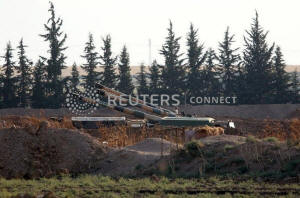Turkish army, Syria rebels to advance into Syria 'shortly': Erdogan aide
 Send a link to a friend
Send a link to a friend
 [October 09, 2019]
By Mert Ozkan [October 09, 2019]
By Mert Ozkan
AKCAKALE, Turkey (Reuters) - Turkish forces
and Syrian rebel allies will push into Syria "shortly", a Turkish
official said on Wednesday, in an operation world powers fear could open
a new phase in Syria's war and deepen regional turmoil.
Turkey has been poised to advance into northeast Syria since U.S. troops
began vacating the area in an abrupt policy shift by U.S. President
Donald Trump widely criticised in Washington as a betrayal of America's
Kurdish militia allies.
On Tuesday, Turkish officials told Reuters that the military had struck
the Syrian-Iraqi border to prevent Kurdish forces using the route to
reinforce the region, though details of the strikes were hazy.
"The deployments, preparations are continuing," Defence Minister Hulusi
Akar told state-owned Anadolu news agency.
Ankara has said it intends to create a "safe zone" in order to return
millions of refugees to Syrian soil, but the scheme has alarmed some
Western allies as much as the risks posed by the military operation
itself.

For Turkey, which views Kurdish YPG fighters in northeast Syria as
terrorists because of their ties to militants waging an insurgency
inside Turkey, an influx of non-Kurdish Syrians would help it secure a
buffer against its main security threat.
The Kurdish-led authority in northern Syria declared a state of "general
mobilization" in light of the looming attack.
"We call on all our institutions, and our people in all their
components, to head towards the border region with Turkey to fulfil
their moral duty and show resistance in these sensitive, historic
moments," it said in a statement.
President Tayyip Erdogan's communications director Fahrettin Altun said
YPG fighters could either defect or fight the Turkish forces, who he
said were also taking over the battle against Islamic State in Syria.
"ARMED THUGS"
"The Turkish military, together with the Free Syrian Army, will cross
the Turkish-Syrian border shortly," Altun wrote in a tweet and in a
column published in the Washington Post. "Turkey has no ambition in
northeastern Syria except to neutralize a long-standing threat against
Turkish citizens and to liberate the local population from the yoke of
armed thugs," he said.
Turkey's Demiroren news agency said Syrian rebels travelled from
northwest Syria to Turkey in preparation for the incursion.
They will be based in the Turkish border town of Ceylanpinar, it said,
across the border from the Syrian town of Ras al-Ain, with 14,000 of
them gradually joining the offensive.
The Hamza Brigade rebels from the National Army, the main rebel grouping
that Turkey supports in northwest Syria, moved in a bus convoy along
with trucks carrying ammunition, DHA said.
"The National Army forces are still preparing for the start of
operations east of the Euphrates (river) and they have started moving to
the frontlines," National Army spokesman Youssef Hammoud said.
Previous Turkish operations backed by the rebels in Syria started with
air operations, Hammoud said.
A large convoy of buses carrying Syrian rebel fighters and trucks loaded
with equipment arrived at the Turkish border town of Akcakale early on
Wednesday, a Reuters witness said.
[to top of second column]
|

Turkish army howitzers are positioned on the Turkish-Syrian border,
near the southeastern town of Akcakale in Sanliurfa province,
Turkey, October 7, 2019. REUTERS/Stringer

At Akcakale, across from Syria's Tel Abyad, howitzers were deployed
behind earth embankments and pointed towards Syria, a Reuters
witness said on Tuesday. Multiple launch rocket systems were
stationed at Suruc, some 60 km (40 miles) to the west, opposite the
Syrian border town of Kobani, he said.
Three vehicles carrying Syrian rebels drove on Turkey's side of the
border area in Akcakale, a Reuters witness aid. A man in one vehicle
waved a rebel flag. Others made victory signs.
RUSSIA CALLS FOR DIALOGUE
Russia, Syrian President Bashar al-Assad's strongest foreign ally,
urged dialogue between Damascus and Syria's Kurds on solving issues
in northeast Syria including border security.
"We heard statements yesterday both from Damascus officials and the
Kurdish representatives that they are ready for such dialogue,"
Foreign Minister Sergei Lavrov told reporters during a visit to
Kazakhstan.
"We will do our best to support the start of such substantive
talks," said Lavrov.
Kurdish-led forces said on Tuesday they might start talks with the
Syrian government and Russia to fill a security vacuum in the event
of a full U.S. troop withdrawal.
Another Assad ally, Iran, urged Turkey to show restraint and avoid
military action in northern Syria, although it said Turkey was
"rightfully worried" about its southern border.
The prospect of a military offensive has unsettled Turkish financial
markets, with the lira this week hitting its weakest level since
late August. The currency firmed slightly to 5.8220 against the
dollar on Wednesday morning.
On Monday, Erdogan said U.S. troops started to pull back after a
call he had with Trump, adding talks between Turkish and U.S.
officials on the matter would go on.
"Unfortunately, Turkey has chosen to act unilaterally. As a result
we have moved the U.S. forces in northern Syria out of the path of
potential Turkish incursion to ensure their safety," U.S. Defense
Department spokesman Jonathan Hoffman said.

Trump's decision to pull back troops has rattled allies, including
France and Britain, two of Washington's main partners in the
U.S.-led coalition fighting Islamic State.
Amid deepening humanitarian concerns, U.N. Secretary-General Antonio
Guterres urged all parties in northeast Syria to exercise maximum
restraint and protect civilians.
Kurdish-led forces denounced the U.S. policy shift as a "stab in the
back". Trump denied he had abandoned the forces, the most capable
U.S. partners in fighting Islamic State in Syria.
(Additional reporting by Dominic Evans in Istanbul, Tom Perry in
Beirut, Tuvan Gumrukcu and Ece Toksabay in Ankara, Maria Kiselyova
in Moscow; Writing by Daren Butler; Editing by Simon Cameron-Moore,
William Maclean)
[© 2019 Thomson Reuters. All rights
reserved.]
Copyright 2019 Reuters. All rights reserved. This material may not be published,
broadcast, rewritten or redistributed.
Thompson Reuters is solely responsible for this content. |